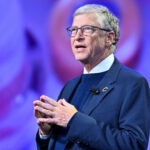The opening ceremony for the 2020 Olympics, delayed by a year due to Covid-19, kicked off Friday just before 7 a.m. Eastern Time in a restrained performance in Tokyo. That the Games would start at all was not a guarantee as recently as Tuesday, when Tokyo 2020 CEO Toshiro Muto told reporters that officials would not rule out a last-minute cancellation. “We cannot predict what the epidemic will look like in the future,” Muto said.
The uncertain start follows a precarious year for the world’s premiere sporting event. On March 24, 2020, about two weeks after the World Health Organization upgraded the coronavirus to pandemic status, Japan’s then-Prime Minister Shinzo Abe announced that the Games — which had been scheduled to begin on July 24, 2020 at a reported cost of $15.4 billion — would be postponed. It was the first time the modern Olympics were postponed since they began in 1896; previously they had been cancelled three times due to World Wars I and II. Two months after the postponement, the president of the International Olympic Committee told the BBC that if the 2020 event didn’t happen in 2021, it too would be cancelled.
Despite today’s opening, Covid-19 continues to vex the Games. Around 15,000 athletes from more than 200 countries are expected to compete; so far, 106 people associated with the Games have tested positive for the virus, including some athletes, and many more are in quarantine. Four American athletes are among the positive cases, including tennis player Coco Gauff, gymnast Kara Eaker, basketball player Katie Lou Samuelson, and beach volleyball player Taylor Crabb.
At least a handful of positive cases came from the Olympic Village, despite assurances from IOC officials that testing and quarantine protocols would make the accommodations a safe “bubble.”
The International Olympic Committee intended to keep that bubble intact, in part, by setting up extensive guidelines to limit the spread of Covid-19, including not allowing fans in the stadium, discouraging close contact such as hugs and high-fives — and even preventing some athletes from competing. American swimmer Becca Myers, who is deaf and blind, left Team USA after she was told she couldn’t bring her personal care assistant with her to Tokyo. But officials did not require athletes to be vaccinated. “It’s obvious that the bubble system is kind of broken,” Kenji Shibuya, the former director of the Institute for Population Health at King’s College London, told Reuters this week. “My biggest concern is, of course, there will be a cluster of infections in the village or some of the accommodation and interaction with local people.”
So far, a minority of Japan’s population has been fully vaccinated against Covid-19.
Polls suggest that the majority of the Japanese public didn’t want the Olympics to go forward, and indeed Friday’s opening was met with protest. Major sponsors have pulled support. Public health officials have also expressed criticism, as has Japan’s medical community. In May, the Tokyo Medical Practitioners Association wrote an open letter to Prime Minister Yoshihide Suga stating that its members “strongly request” a cancellation.
Others have had sharper words. In an op-ed in The Chicago Tribune, former Olympics reporter Philip Hersh accused the IOC of “hubristic arrogance.”
“Trying to have the Olympics this summer seems more like a deal with the devil,” Hersh wrote in May. “It would be selling what little remains of the ideals that once were the Olympics’ soul.”
Also in the News:
• The North American wildfire crisis worsened this week, with more than 80 fires burning in the western United States and some 300 fires spreading in the Canadian province of British Columbia. The vast Bootleg Fire in Oregon, now spanning more than 600 square miles, became so intense that it started generating its own weather — as did the smaller but fast-spreading Dixie fire in northern California. “You don’t want to see lightning strikes coming off of a fire,” a National Weather Service meteorologist told The Mercury News this week. “It’s obviously dangerous for anyone fighting the fire, but when you see it, it means you’re likely having very intense fire growth.” The western fires have generated so much smoke that it is now affecting people thousands of miles to the east. Indiana authorities, concerned about air quality, urged residents to stay indoors; officials gave similar warnings in eastern states such as New York and Massachusetts. Climatologists warned that the conditions enabling the fires, including extreme heat and severe drought, appear to be amplified by human-influenced climate change and that such impacts are happening much faster than predicted. (Multiple sources)
• Earlier this week, a collaborative investigation detailed the global use of a spyware called Pegasus to hack the personal phones of prominent figures and subsequently leak their phone numbers. The spyware, developed by the Israeli surveillance company NSO Group, has the potential to extract private data such as photos, emails, and call records, and can even activate microphones and cameras. According to the report, the leak contains a list of over 50,000 phone numbers of journalists, business executives, activists, politicians, and government officials; included in the leak were French President Emmanuel Macron and family and friends of Saudi journalist Jamal Khashoggi, who was murdered in October 2018. Many of the numbers found on the list are clustered in 10 countries, including India, Mexico, and Saudi Arabia. According to the BBC, the origin of the list and more detail on how many devices Pegasus targeted remains unclear. More information is expected to be released in the coming days. The NSO Group, which sells software to governments for tracking of criminal and terrorist activity, has denied any wrongdoing. (BBC)
• Amid widespread criticism, Amazon founder Jeff Bezos completed a successful launch to the edge of space on Tuesday, marking the first crewed mission for his private space company Blue Origin. Along with his brother Mark and Dutch student Oliver Daemen, Bezos was accompanied on the trip by pilot Wally Funk, who at 82 is the oldest person to travel to space. Funk had undergone training to become an astronaut back in the 1960s, but the Blue Origin flight marked her first opportunity to go to space. The group’s 11 minutes in space, coupled with Virgin Galactic founder Richard Branson’s trip above the Earth last week, signals the beginning of commercial space travel — for those who can afford it. While Bezos thanked Amazon customers and employees for their support in funding his endeavor, critics were quick to the highlight the stark inequality it laid bare. “Yes, Amazon workers did pay for this — with lower wages, union busting, a frenzied and inhumane workplace, and delivery drivers not having health insurance during a pandemic,” Rep. Alexandria Ocasio-Cortez wrote on Twitter. Others focused on the environmental impact of space travel and lambasted Bezos for suggesting a solution for protecting the Earth could be moving polluting industry into space. (Multiple Sources)
• Government officials and rescue workers in western Europe continue to survey the damage of catastrophic flooding that has now claimed the lives of around 200 people, with more than a hundred still missing. “I can almost say that the German language doesn’t have words for the devastation,” German Chancellor Angela Merkel told the press, while surveying the town of Adenau, in Rhineland-Palatinate, one of the worst hit areas in western Germany. The current death toll in Germany is around 170, with 31 confirmed dead in Belgium. The Netherlands managed to avoid flood related fatalities but thousands of residents had to be evacuated from their homes in the country’s southern region, situated near the river Maas, which had swollen to water levels not seen in a hundred years due to heavy torrential downpours. Some areas in western Europe, such as Cologne, Germany, saw far more rainfall in 24 hours than they had received in the entire month of July in previous years. Scientists say that climate change will likely impact the frequency of extreme rainstorms and flooding, but to what extent for now remains speculative. (CNN)
• And finally: Could “shark attacks” become a thing of the past? The term — which scientists say stokes unwarranted antipathy toward the animals — may be going out of vogue in Australia, reports The Sydney Morning Herald this week. An official from the Queensland Shark Control Program recently told a symposium that the state’s communications would now preference “bites” over “attacks” when describing shark encounters. (Queensland’s Department of Agriculture and Fisheries told The Morning Herald that it has received “no formal direction in this space,” but symposium attendees said the official’s message was clear.) In neighboring New South Wales, the state agency responsible for fisheries and aquaculture has also shifted its language, saying it “generally refers to ‘incidents’ or ‘interactions’ in our formal shark reporting.” Many marine scientists say the changes are long overdue. They note that more than one third of shark encounters result in no injuries to the human, and that the odds of suffering severe injury are slim. Still, the old terminology holds sway throughout much of the world: In Florida, which leads the U.S. in shark encounters, the Fish and Wildlife Conservation Commission continues to refer to them as “shark attacks.” (The Sydney Morning Herald)
“Also in the News” items are compiled and written by Undark staff. Deborah Blum, Lucas Haugen, Sudhi Oberoi, Jane Roberts, and Ashley Smart contributed to this roundup.










